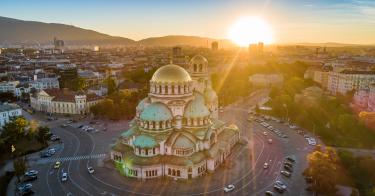Economic freedom has been growing rapidly in Bulgaria, one of Eastern Europe’s least heralded reformers. The country’s score in the latest edition of The Heritage Foundation’s annual Index of Economic Freedom is 70.2 (on a 0-100 scale), making its economy the 36th freest out of 180 countries measured.
Bulgaria’s score has climbed a total of almost eight points over the past decade, making it one of the most improved countries in the index. This year, it left the index designation of “moderately free” to join the ranks of countries designated “mostly free.”
Bulgaria will need every bit of that economic freedom to help it deal with the fallout from the coronavirus pandemic. As The Economist Intelligence Unit reports, “Lockdown measures to limit the coronavirus outbreak in Bulgaria and in major trading partners will have a large, adverse effect on the domestic economy in 2020.”
>>> What’s the best way for America to reopen and return to business? The National Coronavirus Recovery Commission, a project of The Heritage Foundation, assembled America’s top thinkers to figure that out. So far, it has made more than 260 recommendations. Learn more here.
The Economist estimates that real GDP will “contract by at least 5.8%” and that unemployment will surge.
Bulgaria’s economy is relatively better positioned to recover from this setback because of its hard-earned, pre-pandemic levels of economic freedom.
A total or partial lockdown of the economy by the government equates to a total or partial freeze on economic freedom. Only government has the ability to act with such coercion, and the threat to Bulgaria’s economic freedom from coercive government policies or actions is real.
Fortunately, Bulgarians’ pre-crisis experience of economic freedom gave them a benchmark with which to measure the destructive effects of the lockdown, and also the tools needed to restore it.
The results of the 2020 Index of Economic Freedom confirm yet again the importance of economic freedom in promoting rapid growth and sustainable social progress.
Citizens of “free” or “mostly free” countries enjoy incomes that are more than double the global average and more than five times higher than in “repressed” economies.
The link between improvements in economic freedom and economic growth is robust. Expanded economic freedom has contributed to a doubling of world GDP in the years since the Index of Economic Freedom debuted in 1995, lifting hundreds of millions of people out of poverty.
People in economically free societies live longer, enjoy better health, have higher quality “social goods” such as education, and have the resources to become better stewards of the environment.
As it recovers, Bulgaria should aim to move even higher in the mostly free category. To do so, the government will have to implement reforms that address the additional deficiencies that are reflected in the country’s still-low scores for judicial effectiveness and government integrity.
In fact, the Institute for Market Economics a like-minded think tank in Bulgaria’s capital of Sofia, is already hard at work on judiciary reform and transparency in Bulgaria.
According to the Atlas Network, the “judiciary system in Bulgaria has been extremely effective at silencing its critics through negative media campaigns. [The Institute for Market Economics] has been one of the few organizations that has continued to regularly release articles and studies critical of the judiciary and calling for reform.”
The goal of the institute’s executive director, Svetla Kostadinova, is to achieve in Bulgaria “an effective, accountable, and reformed judiciary system that protects citizens and companies’ rights.”
Achieving that goal won’t be easy. As the 2020 index notes, property rights are not well protected. Jurisprudence is inconsistent, and the judiciary continues to be the least trusted institution in the country.
In addition, Bulgaria has one of the lowest scores in Europe on the Corruption Perceptions Index. Transparency International, which compiles that index, reports persistent and unaddressed problems that include dirty money in politics, unregulated lobbying, a lack of uniform anticorruption policies, nontransparent appointments to key public offices, and no clear ethics policy for the parliament.
Reopening the post-pandemic economy with a renewed commitment to economic freedom principles could help the government fortify political and economic stability at home and assure Bulgaria’s role as a regional leader in economic freedom.
This piece originally appeared in The Daily Signal



